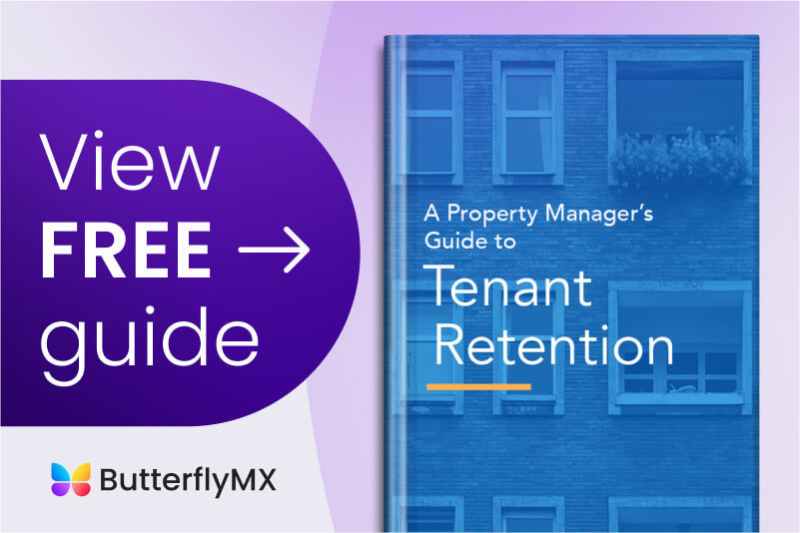Key takeaways
- Centralized property management is the process of consolidating the management, operations, and decision-making of properties into one location or select individuals.
- There are many tools that help implement centralized management in real estate, such as virtual assistants, resident portals, and cloud-based access control.
- Multifamily centralization increases NOI because it streamlines workflows, enriches data, and helps retain more residents.

When it comes to real estate, efficiency is everything, which is why centralized property management is such an essential concept.
Centralization is implemented in many different ways, so this guide will cover everything you need to know. You’ll learn what centralized property management is and how it works. Most importantly, you’ll discover how centralization in multifamily properties increases net operating income (NOI).
This post covers:
- What is centralized property management?
- How does centralization work in real estate?
- 5 ways centralization in multifamily boosts NOI
What is centralized property management?
Centralized property management is the act of managing and operating multiple properties from a regional or national location to increase efficiency.
For instance, instead of having on-site offices at each property, a centralized office is located near all of the properties so it can offer support when necessary. As such, the process of leasing and managing the property’s daily operations is handled by the centralized office. In some cases, the central office also deploys labor to properties for assistance in the form of maintenance technicians and leasing agents.
While the concept of centralized leasing and property management isn’t new, it’s grown in popularity because of the rapid changes the real estate industry has undergone. Of course, this type of management model can be extremely beneficial, but it’s not for everyone.
What is centralized management?
Generally, centralized management is when management and decision-making are handled by a concentrated group of individuals, a person, or a location. For example, the accounting duties for multiple properties may only be performed at the corporate level. Thus, staff at the properties can manage other duties, such as organizing maintenance or managing property access for residents and guests.
What is the difference between centralized and decentralized management?
The difference between centralized and decentralized management is how decisions are made.
Centralized management means decisions are made in one place or by a single person or a specific team of leaders or individuals.
On the other hand, decentralized management enables teams from various locations or departments to make their own decisions, promoting creativity and communication.
How does centralization work in real estate?
Centralization in real estate works by taking all or select property operations off-site.
In fact, there are numerous tools available for successful multifamily centralization:
- Virtual assistants. Offer prospective residents and current residents an easy way to get answers regarding rent, available units, amenities, and more. Furthermore, virtual leasing agents are low-cost ways of attracting more residents because of the answers they can provide and, in some cases, the functions they can perform, such as scheduling tours.
- Self-guided or virtual tours. Enable prospects to tour your property’s units by enabling self-guided tours or recording virtual tours. As a result, prospects can view the apartment on their own schedule without having to wait for a leasing agent.
- Cloud-based access control. Maintain the property’s security and safety with a centralized access control system you can manage from anywhere. Cloud-based access control systems are ideal as residents can use their phones to grant themselves, visitors, or delivery drivers access to the building. Additionally, property management can implement self-guided tours when using a solution with customizable Visitor Passes.
- Resident portals. Accept payments, manage maintenance requests, and develop a community through an online resident portal. Then, residents can review their rent at any time or check the status of their request. In turn, residents are more satisfied with their living experience.
Furthermore, centralization is not always comprehensive, meaning it doesn’t include all of a property’s responsibilities.
Some areas of property management that are commonly centralized include:
- Leasing
- Finances
- Accounting
- Marketing
- Communications
5 ways centralization in multifamily boosts NOI
Net operating income is one of the paramount financial metrics for real estate. So, if centralization can boost NOI, then many properties may consider the switch.
But how exactly does centralization in multifamily help NOI?
Well, real estate centralization boosts NOI in the following five ways:
- Streamlined workflows
- Employee satisfaction and retention
- Rich data insights
- Tenant retention
- Effective marketing
Learn everything you need to know about access control:
1. Streamlined workflows
Centralizing various duties for a property creates efficiency. Rather than on-site leasing staff dealing with marketing or finances, they can provide better customer care for residents and prospects. In other words, offloading those tasks to a centralized team creates a streamlined workflow for on-site team members.
Conversely, if there is no on-site staff, the centralized team takes on specialized roles, giving them the ability to focus on a specific area of property management. By giving team members specific roles and responsibilities, your team’s workflows are more efficient as they perform tasks only in their specialization.
2. Employee satisfaction & retention
As centralization leads to specialization in roles, employees hone their skills and expand their knowledge for their careers. As a result, specialization leads to employee satisfaction and, in turn, higher retention.
3. Rich data insights
Without centralization, on-site property management teams can only interpret the data their own property collects about its residents. Thus, their data set is much smaller. However, if you were to centralize property management of multiple assets, you’d be able to gather data from multiple properties.
Then, your team could analyze that data to enrich the resident experience, improve amenities, market more effectively to prospects, and more. With a larger data set, your team becomes more knowledgeable about the renter market and your target audience, and therefore, you operate successful properties.
4. Tenant retention
Marketing, leasing, and customer service are essential aspects of attracting and retaining tenants for your multifamily or commercial property. However, performing all of these duties with a decentralized property management team is difficult. So, if you centralize either one or multiple of these areas, you’ll be more effective in retaining tenants.
For example, centralizing marketing and leasing efforts allows on-site staff to maintain a higher quality of customer service that tenants want. Thanks to marketing and leasing duties being moved to a centralized team, property managers and staff can spend more time with the tenants and their needs.
Additionally, centralization helps retain tenants by:
- Creating consistent branding.
- Maintaining a reliable online portal accessible anywhere.
- Personalizing the customer’s journey based on their preferences.
5. Effective marketing
Finally, when a centralized team handles marketing and leasing efforts, you’ll have a better time maintaining consistency at scale. Not only will your brand remain consistent across all channels, but messaging will also improve.
For instance, multiple leasing agents could offer varied answers to the same questions. As a result, residents get different interpretations, which can come off as disingenuous and unsatisfactory. So, centralized marketing creates a consistent voice that addresses all prospects and residents at any time.
Overall, centralized leasing and marketing develop a consistent brand across all assets that can be leveraged to retain residents, attract prospects, and, most importantly, boost NOI.







